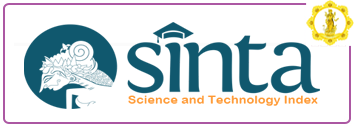Komitmen Pimpinan dalam Implementasi Sistem Penjaminan Mutu Akademik Perguruan Tinggi (Studi Kasus pada STKIP PGRI Tulungagung)
DOI:
https://doi.org/10.25078/jpm.v5i1.669Keywords:
Commitment, Quality Assurance System, UniversitiesAbstract
The quality assurance system at Higher Education (especially in STKIP PGRI Tulungagung) is a must that must be done systemically, planning and sustainable through the establishment, implementation, evaluation, control and improvement of National Education Standards. In its implementation, the quality assurance system at STKIP PGRI Tulungagung has not run in accordance with the demands of the rules that are planned in a planned and consistent manner so that quality assurance is carried out sporadically.
The study used a qualitative approach with the research subjects being policy makers (Chairperson, Deputy Chairperson and Head of the Quality Assurance Agency), as well as the academics of STKIP PGRI Tulungagung, data collection techniques, using observation, interviewing, and documentation techniques. Data analysis techniques use the Miles and Huberman models. And in checking the validity of the data, researchers extended their participation, observation persistence, triangulation and peer discussion.
The results show that; first, quality assurance at STKIP PGRI Tulungagung has been carried out through the STKIP PGRI Tulungagung Education Quality Assurance Agency, while the quality assurance activities at STKIP PGRI Tulungagung are oriented towards strengthening and fulfilling the accreditation of study programs; second, the factors that become obstacles in quality assurance at STKIP PGRI Tulungagung are (a) the unavailability of quality manual documents; (b) the low level of leadership and academics, (c) human resources, (d) commitment, third communication technology systems, as well as strategies for improving quality assurance that must be carried out by institutions namely through meeting national quality standards.
The findings above are recommended; first, to the leadership of STKIP PGRI Tulungagung to improve insight, commitment and quality awareness as well quality culture through establishment, implementation and evaluation, control and increase in the National Standards for Higher Education in the STKIP PGRI Tulungagung environment
Downloads
References
Aranya. (n.d.). Are-examination of Accountan Organizational – Profesional Conflict.
J.Allen, N., & P.Meyer, J. (1990). The Measurement and antecedents of affective, continuance and normative commitment to the organization.
Junaidah. (n.d.). KONTRIBUSI PEMIMPIN PENDIDIKAN DALAM MENINGKATKAN MUTU PENDIDIKAN DI PERGURUAN TINGGI, 75–99.
Kis, V. (2005). Quality Assurance in Tertiary Education: Current Practices in OECD Countries and a Literature Review on Potential Effects. Organisation for Economic Co-operation and Development. Directorate for Education. Education and Training Policy Division, (August), 47. Diambil dari http://www.oecd.org/education/skills-beyond-school/38006910.pdf
Luthans, F. (2012). Organizational behavior an evidence-based approach 12th edition. Organizational behavior: an edivence-based approach.
Pandey, B. (2011). Pengaruh Kualitas Sumber Daya Manusia, Sarana Pendudkung dan Komitmen Pimpinan Terhadap Kinerja Satuan Kerja Perangkat Daerah (SKPD) Dalam Menyusun Laporan Keuangan SKPD di Lingkungan Pemerintah Provinsi Sulawesi Utara, (2), 60–73.
Pendidikan, D. (2003). Pedoman penjaminan mutu.
Porter, M. E. (1980). Competitive strategy: Techniques for analyzing industries and companies. New York. Diambil dari http://www.vnseameo.org/ndbmai/CS.pdf
Robbins, S. (2013). Organizational Behavior. Zhurnal Eksperimental’noi i Teoreticheskoi Fiziki. https://doi.org/10.12737/4477









